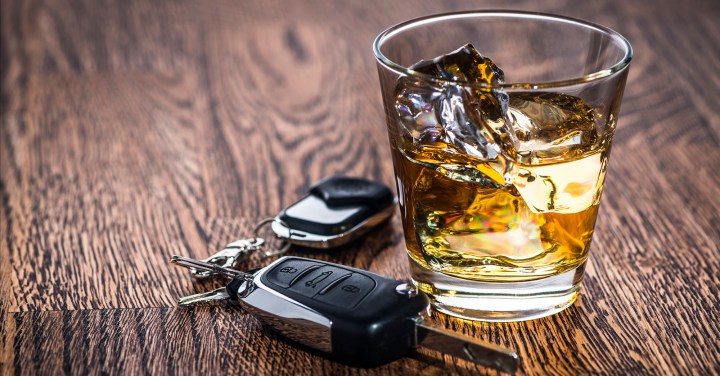SOBER ASSESSMENT OP-ED
Zero-tolerance drink-driving policy will make big impact in cutting road carnage

Alcohol intoxication is a major contributing factor to the staggering burden of road traffic crashes and injuries in South Africa, accounting for at least one in every four fatal crashes that result from driver error.
The Parliamentary Portfolio Committee on Transport on 16 September rejected a clause that seeks to revise a section of the Road Traffic Amendment Bill dealing with the proposed zero-tolerance legislation for driving (specifically, clause 46 and amendment of section 65 of the National Road Traffic Act 93 of 1996).
The proposed amendment of the bill would have made it unlawful for a driver to test positive for any blood alcohol concentration (BAC), a departure from the current provision that allows up to 0.05g of alcohol per 100ml of blood for the general driving population. The bill was already put forward in 2015 and is therefore not new legislation, but was prioritised by the minister of transport during the peak of the Covid-19 pandemic in South Africa, in the face of heightened attention to the role of alcohol in trauma outcomes in the country.
This rejection of the proposed revision was reported to be the result of stakeholder and public opposition that included the key challenge of enforcing a zero-alcohol limit in light of the widespread use of common alcohol-containing products such as mouthwash.
Notably, the decision contradicts recommendations made by other research and policy organisations at the public hearing on the bill that included the South African Medical Research Council and the Southern African Alcohol Policy Alliance which, in recognition of this challenge, advocated for a 0.02g/100ml threshold, with administrative rather than criminal sanctioning between 0.02-0.05g/100ml.
Accordingly, this recent portfolio committee decision begs an interrogation of the information and arguments used to inform the decision-making by the various stakeholders and the importance for legislative considerations of being guided by the available scientific evidence.
In a paper published on 29 September 2022 in the South African Journal of Science, we critically examine global research and experiences with lowering the BAC threshold for driving to provide contextually relevant recommendations on a zero-tolerance drink-driving strategy for the country.
We argue that like other public health challenges (for example, tobacco and sugar use) where research and evidence had allowed for a radical shift in our public health response, it is timely that the burden of alcohol-related harms (including that on the roads) be considered in a similar light to bring about a change in our relationship with alcohol and its pathological use.
South Africa’s burden of alcohol and drink-driving
The enormous societal and health impacts of alcohol on South Africans are well known. About one-third of South Africans aged 15 years and older consume alcohol and nearly one in every 10 is afflicted with alcohol-related disorders. Alcohol intoxication is a major contributing factor to the staggering burden of road traffic crashes and injuries in the country, accounting for at least one in every four fatal crashes that result from driver error.
A range of other high-risk behaviours such as speeding and aggressive driving are also related to the use of alcohol, resulting in a range of other related road safety challenges, with low levels of enforcement and generally inadequate road safety responses exacerbating the burden of drink-driving in the country.
Clinical research shows that alcohol is strongly associated with a deterioration in cognitive and visual functions, and impaired attention and responses to driving hazards.
Even at BAC levels lower than the WHO-recommended good practice threshold of 0.05g/100ml for the general driving population, there is still significant impairment in driver performance. Accordingly, research has shown reductions in the rate of both fatal and severe alcohol-related traffic injuries with a reduction in thresholds from 0.05g/100ml to the 0.01-0.03g/100ml range.
However, across the world, only six countries (Brazil, Hungary, Paraguay, Slovakia, Uruguay and Vietnam) have BAC threshold limits set at zero. In Africa, six countries have their maximum allowable BAC limit set at 0.05g/100ml (Botswana, Burkina Faso, Eritrea, Guinea Bissau, Mauritius and Nigeria), two countries at 0.03-0.04g/100ml (South Africa and Eswatini) and one country at 0.01-0.02g/100ml (Mali).
Visit Daily Maverick’s home page for more news, analysis and investigations
Also, very few countries have adopted strict zero-tolerance legislation and policies per se, with emerging research having been undertaken mainly in South American countries, including Brazil, Chile and Uruguay. These countries share many similarities in contextual challenges with South Africa, especially in relation to an entrenched culture of drinking, the availability of cheap alcohol, and the generally low levels of road traffic enforcement.
Notably, these countries provide for a margin of tolerance in their legislation, usually in the range of 0.02-0.03 g/100ml to accommodate challenges with the ability to reliably detect very low levels of alcohol using breath-testing equipment or the detection of small amounts of alcohol in the breath of motorists who may have used alcohol-containing products.
The adoption of zero-tolerance policies in these South American countries was found to be effective and was associated with significant reductions in the combination of fatalities, non-fatal traffic injuries, or alcohol-related crashes.
SA contextual challenges that exacerbate alcohol misuse
Long-standing historical policies and practices around the availability and public consumption of alcohol have a large bearing on the high levels of problem drinking and dysfunctional coping among many South Africans.
Under the country’s apartheid regime, patterns of alcohol consumption were shaped by the use of alcohol as a means of coping with social stresses and injustices, unregulated drinking in illegal establishments that perpetuated excessive drinking, and the notorious “dop” system that supported the remuneration of indigenous workers with alcohol.
In present times, the proliferation and misuse of alcohol are sustained by socioeconomic challenges and a dominant liquor industry, especially through strong and opportunistic marketing and the undermining of policy and legislative efforts focused on social transformation. The strong marketing forces are evident from the widespread practice of recreational drinking in marginalised community settings, and of concern more recently is its impact on children, such as with the spate of recent tragedies at tavern settings involving young school-going children.
The liquor industry has also been implicated in delays and stalling tactics with alcohol-related bills focused on public health promotion (for example, the Control of Marketing of Alcoholic Beverages Bill of 2013 and the Liquor Amendment Bill of 2016), and with the repeal of an amendment to regulations related to health messages on container labels of alcoholic beverages.
A zero-tolerance drink-driving policy in SA
Based on international research from both middle- and high-income countries that have good road safety track records, there is significant evidence to support the adoption of zero-tolerance legislation, but at a BAC threshold limit for the general driving population set at 0.02g/100ml (rather than the zero-BAC limit proposed through the Road Traffic Amendment Bill), to accommodate for a range of challenges with detection, enforcement and prosecution at a zero-BAC limit.
A higher burden on state resources may also be expected from increased enforcement, prosecutions and contestations with the adoption of a zero-BAC limit, a critical issue in the current resource-strained climate of the country.
However, we also propose the adoption of a broader gradualist approach for implementation that is sensitive and compassionate to the enduring impact of historical context to alcohol-related harms, including a range of strategies centred on public engagement and the phasing of complementary interventions to enable and sustain behaviour change.
Public engagement is widely recognised as crucial for fostering public acceptance and thus enhancing sustainability with government interventions. A phased strategy with a preparatory phase would allow for an incremental approach to the introduction of enforcement measures to allow time for transitioning and behavioural modification among those who would be most affected by stricter enforcement.
In addition, a phased strategy would also allow for the timely introduction of education, awareness and harm-reduction measures, and other supporting legislation such as a graduated driver licensing system to complement the zero-tolerance legislation.
Last, a holistic approach is recommended whereby the above efforts are aligned with strategies that focus on the structural and upstream drivers of excessive alcohol consumption, including the interrelated influences of socioeconomic deprivation, mental health conditions, substance abuse and addiction. DM
Dr Anesh Sukhai, Prof Ashley van Niekerk and Prof Mohamed Seedat are with the Unisa Institute for Social and Health Sciences, and the SAMRC-Unisa Masculinity and Health Research Unit.

















As with so many things on SA, policy itself is not the issue, enforcement however is. If we were to enforce current alcohol limits properly, we would already be saving alot of people. And why don’t we enforce properly? And so we are right back to a corrupt ANC that has destroyed all institutions including our law enforcement.
Exactly right. The learned doctors and professors who penned this article are unfortunately missing the point. There is no point in passing any more traffic laws. Not until the current laws are properly enforced.
agree 100% – what would be interesting to see is what the actual BAC for the drivers “accounting for at least one in every four fatal crashes that result from driver error”. I’d hazard a bet that it was way over the 0.05 limit, so reducing the limit won’t make any difference, enforcement however might – but we all know that already! Maybe Zero for those “professional” drivers – Bus, Taxi, Delivery truck drivers . . .
If they can police the current limits correctly. The a zero limit might have an impact.
This is more a waste of paper and a open door to bribing than anything
There is currently no enforcement of any traffic laws and if 3 out 4 accidents are caused by sober people, then start there. Drunk drivers know they won’t be caught no matter the limit. I support debilitating fines for traffic offences and driving bans for any drunk driver.
about 10,000 people die per year on our roads – so on the quoted stats = 2,500 drunk driving deaths could be avoided if somehow the law was 100% effective in preventing drunk driving. About 90,000 people die from TB in SA each year. If we only slightly improved early diagnosis and treatment a 10% reduction would save almost four times the number of deaths avoided. And it is possible. Treatment is very hard (ask me I was on TB meds for nine months till Feb this year). But I suppose TB treatment is not as sexy or spectacular a campaign as drunk driving…
If only the authorities could enforce existing laws THAT would make a huge difference. No new ones needed at present.
There is no report on the effect of just properly enforcing the current limits so the statistics regarding improvement are provided against a zero backdrop.
Just a thought: an effect of 0% alcohol tolerance is to make a criminal of a law abiding and temperate person who has a single glass of wine at home and then a bit later drives his/her dog to the vet or drives to the doctor or ER for a minor emergency (say a deep cut to the finger that doesn’t need an ambulance) or just drives down to the corner cafe for a refreshment.
Somebody needs to think through the implications of these unnecessarily extreme quick fix solutions to zero level law enforcement. It is not only about a person who goes out for a meal or to a club.